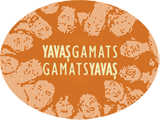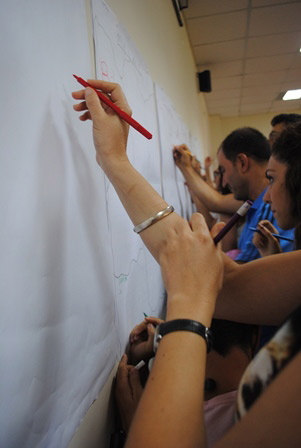9-16 August 2015 in Armenia
Helsinki Citizens' Assembly (hCa) in Istanbul, Turkey & Vanadzor, Armenia organise YavasGamats Summer Schools for teachers and teacher candidates from Armenia and Turkey.
The first round of Yavas-Gamats summer school for the participation of young teachers and teacher candidates from Turkey and Armenia was organized in 2014, in Kocaeli Turkey, with the aim to contribute to confidence-building between the two societies.
Please see: http://www.yavasgamats.org
The second round of hCa Yavas-Gamats Summer School will be held on 9-16 August 2015 in Armenia.
The 7-day programme includes thematic lectures by scholars from a range of disciplines, authors, journalists and film-makers from Armenia and Turkey. A major part of the program is made up of workshops, roundtable discussions, group work sessions, a language “crash-course” in Armenian/Turkish and film screenings aimed to widen the perspectives of participants, while strengthening their skills in conflict transformation.
Who can apply?
→ Teachers in active, professional practice up to 5 years, in primary & secondary education (class teachers or branch teachers)
→ University Students in the Education Faculties
from Armenia and Turkey.
Application Period: 8 April – 5 June 2015
- Travel (İstanbul-Yerevan-İstanbul flight) and accommodation costs of selected participants will be covered by the organizers.
- Simultaneous interpretation in Armenian & Turkish will be provided throughout the full programme.
The application form is attached.
* “Gamats” & “Yavaş” mean “Slow” in Armenian & Turkish respectively. A previous summer school program with the same title “YavaşGamats” was held in 2005, in Antakya/Turkey.
About the summer school
Education provides a versatile and fertile platform for the formation, expression and also transformation of collective perceptions, mindsets, attitudes and behaviours regarding conflicts that afflict societies. While the content and methodology of the curriculum in Armenia and Turkey may not be much promising in transcending the obstacles towards reconciliation at societal level and dissolving the mistrust, teachers do hold the potential means in their hands to work even within the constraints of the established, formal education system, without necessarily depending on total, comprehensive policy reforms to improve matters on the ground. While improvement of formal education policies and relevant transformation of curricula (both in pedagogy and in content) is definitely a mid- & long-term strategic focus for advocacy, there is also space for immediate, practical transformation that can be brought in the relations and learning environment, that is to stay in the classroom, alongside efforts to achieve these larger objectives. Indeed, there is a lot that can – and needs to - be done, whether or not the reforms in policy and formal regulations are achieved, or actually, even after they get to be accomplished. The gist of the matter lies first and foremost in the formation, attitudes and competences of practitioners in education, in terms of both their personal and professional capacities, and, probably not solely in the formal-administrative plane.
Teachers form the largest and most critical segment in the formal education system, and, they are not just public servants. Teachers are in fact citizens that hold a critical potential power as key actors in any societal transformation process, for better, or, for worse.
This much needed and legitimate reinforcement of teachers from a professional point of view does not necessarily depend upon formal/massive changes in the education system as a prerequisite condition, nor does it call for any breaching of administrative procedures.
In case teachers act in the classroom as role models and multipliers of a language, mindset, attitudes and practices, and coach behaviours promoting peace, confidence and reconciliation, they can introduce a positive vision to children and youth.
This potential across the field of educators – currently in professional practice as teachers, or, teachers-to-be as university students in education faculties – promises a fertile field to build and strengthen multiple bridges and mutual trust across rifts of conflict across and between communities. And so it does in tackling the Turco-Armenian conflict and the associated lack/weakness of trust through opening up perspectives and by strengthening new lines of dialogue, incentive and collaborative action towards rapprochement & reconciliation between Armenia & Turkey, at the level of civil society.
The programme is structured in line with its basic aim, by building a friendly, productive environment and trust amongst the participants, promoting active collaboration in composite groups and improving professional / personal skills that nurture mutual understanding, peaceful transformation of conflicts and confidence in social interactions, and in particular, in the classroom.
Conditions of application and evaluation
- Teachers in professional practice up to 5 years (working as class or branch teachers) in primary/secondary education from across Armenia & Turkey,
and,
- University students from across Armenia & Turkey (studying in an education faculty is a preferable asset, solely in terms of project objectives, in the evaluation and identification of participants)
may apply to this program.
- The application deadline of the Summer School is on Friday, 5 June 2015.
- Upon the review and evaluation of applications, total of 40 participants will be identified, ideally, 20 from each country, observing a balance between professional teachers and teachers-to-be currently studying in education faculties.
- The language of the summer schools will be in Turkish and Armenian. Simultaneous interpretation will be provided throughout the programme. However, the evaluation process will make sure that a sufficient portion of the participants from both countries speak English, in order to facilitate communication amongst participants outside of the programme hours.
- All applicants will be provided a positive or a negative response. The application results will be announced on 15-19 June 2015.
- Applicants from Turkey should send their application forms to This email address is being protected from spambots. You need JavaScript enabled to view it. Çiğdem Demirbilek (hCa-Istanbul)
- Applicants from Armenia should send their application forms to This email address is being protected from spambots. You need JavaScript enabled to view it. Armine Sadikyan (hCa- Vanadzor)
This summer school programme is implemented within framework of the larger scale programme, “Support to the Armenia-Turkey Normalisation Process” implemented by a consortium of eight civil society organisations from Armenia and Turkey, with financial assistance of the European Union under the Instrument for Stability. The programme aims to promote civil society efforts towards the normalisation of relations between Turkey and Armenia and towards an open border by enhancing people-to-people contacts, expanding economic and business links, promoting cultural and educational activities and facilitating access to balanced information in both societies.
“Support to the Armenia-Turkey Normalisation Process” will last for 18 months from January 2014, through July 2015. The collaborating partners are Civilitas Foundation (CF), Eurasia Partnership Foundation (EPF), Public Journalism Club (PJC), Regional Studies Center (RSC) from Armenia; and Anadolu Kültür, the Economic Policy Research Foundation of Turkey (TEPAV), Helsinki Citizens’ Assembly (hCa), and Hrant Dink Foundation from Turkey.
“Support to the Armenia-Turkey Normalisation Process” includes a series of activities such as media support, TV talk shows and citizen reporting to contribute to better mutual understanding. The programme also involves travelling discussions; workshops and trainings for youth and teachers; exchange of artists, architects, and entrepreneurs; fellowship opportunities and travel support to enhance encounters and cooperation across the border; research on business and economic opportunities; discussions by celebrity figures on the past; and opinion exchanges of high-level former officials.
 This activity takes place within the framework of the Support to the Armenia-Turkey Normalisation Process programme, funded by the European
This activity takes place within the framework of the Support to the Armenia-Turkey Normalisation Process programme, funded by the European




